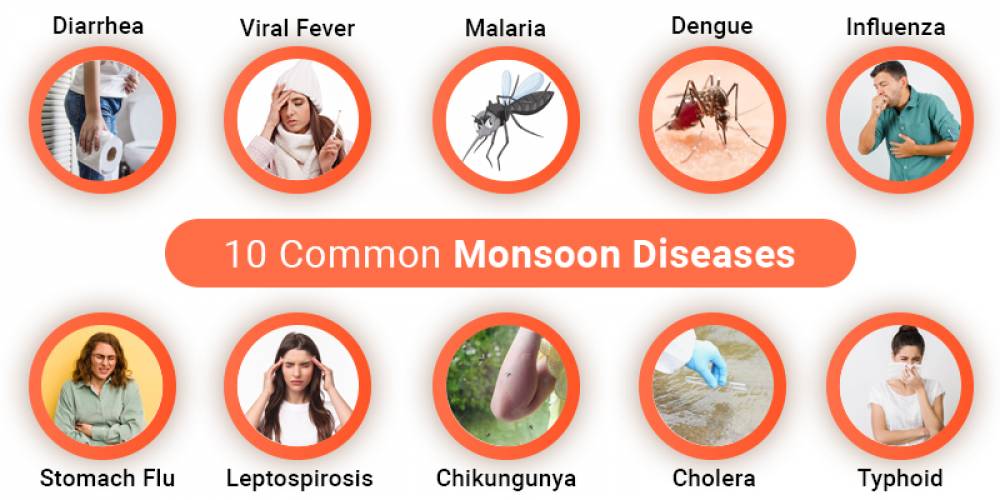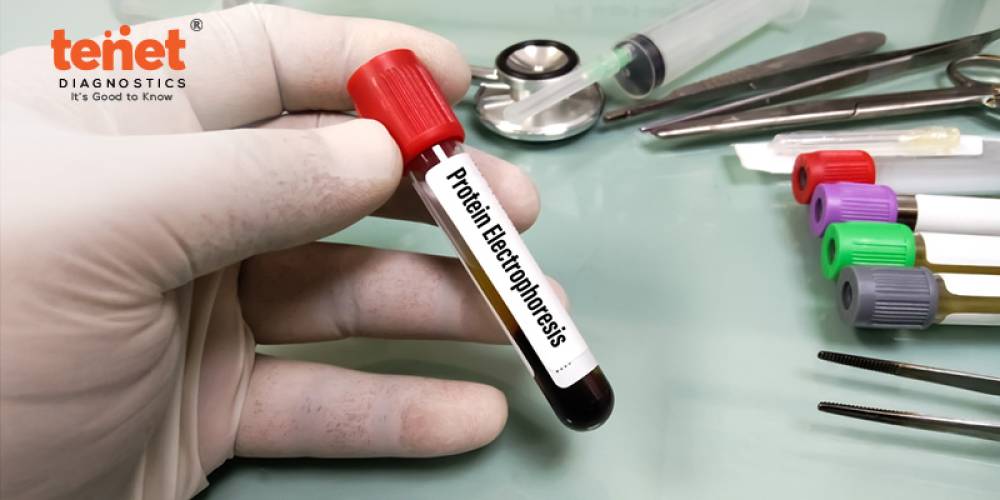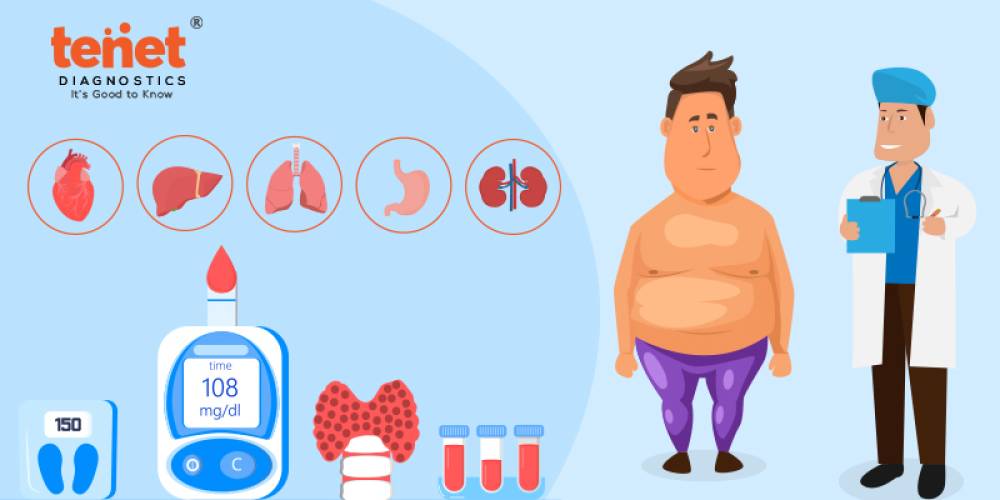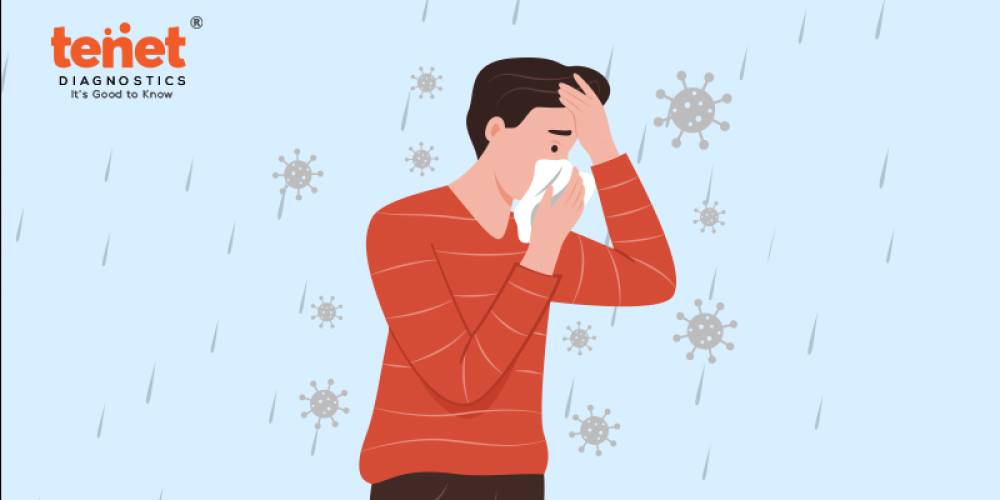India often sees annual showers from June to September, which offer relief from the searing heat. Unfortunately, although it provides comfort, it also spreads a wide range of illnesses and infections. Compared to other seasons, monsoons have a higher risk of exposure to viruses, germs, and other diseases. In addition, microorganisms can flourish in these circumstances due to the increased air humidity and puddles created by stagnant water after rain. The first thing that comes in diagnosis is a CBP blood test which is the standard test for most monsoon diseases.
In short, these illnesses go untreated, which results in morbidity, mortality, and further transmission in the community. Individuals and the community can remain healthy and free from infectious diseases by practicing basic hygiene, taking preventive measures, seeking an early and accurate diagnosis, and receiving the proper treatment.
10 Most Common Monsoon Diseases
Many monsoon illnesses are not discovered until they seriously affect a person's health. However, you may stay safe during India's dangerous disease season by practicing early detection and some simple preventive and hygiene measures. This list of monsoon diseases are ones you should be aware of during this muddy, rainy season:
1. Dengue
The most typical illness brought on by tiger mosquitoes. Among other things, dengue symptoms include a high fever, a low platelet count, rashes, and hypersensitivity. To keep this mosquito out of your workspace or house, use insect repellents and mosquito-repelling plants like citronella. In addition, it will be beneficial to dress in clothing that covers your complete body to stop the dengue fever causes.
Dengue Fever Symptoms:
• High fever
• Swollen lymph nodes
• Rashes
• Headache
• Low palette count
• Hypersensitivity
The best method for dengue fever treatment is to stay away from mosquito bites and get the proper care as soon as you're diagnosed. When sleeping, cover up with a net to prevent mosquito breeding indoors. If there is a dengue outbreak nearby, stay inside.
2. Chikungunya
Chikungunya fever is primarily spread by mosquitoes that hatch in stagnant water found in air conditioners, refrigerators, plants, utensils, and water pipes. Aedes albopictus mosquitoes carry this disease by their bite. This mosquito can bite you both during the day and at night. Fever and joint discomfort are two of the most typical signs of chikungunya.
Symptoms:
• Acute joint pain
• High fever
• Fatigue
• Chills
The most excellent method of preventing chikungunya is by cleaning up surfaces or containers with stagnant water, applying insect repellent, and getting a chikungunya test for an accurate diagnosis.
3. Malaria
Malaria is instigated by the female anopheles' mosquito, which breeds in waterlogged areas. Malaria is the most prevalent disease during the monsoon season. The most noticeable signs of malaria include weakness, chills, and fever.
Malaria Symptoms
• High fever
• Body ache
• Body Chills
• Sweating
• Severe anemia
Cleaning your home's water tank frequently and maintaining a clean environment are the greatest ways to fight off malaria mosquitos. Get yourself tested with a malaria blood test if you experience any symptoms.
4. Cholera
Yet another monsoon illness was brought on by consuming contaminated food and drink. Cholera is one of several diseases spurred on by poor sanitation and hygiene. The most typical sign of this monsoon sickness is diarrhea and loose stools.
Symptoms:
• Low blood pressure
• Thirst
• Muscle cramps
• Rapid heart rate
• Dry mucous membrane
• Loss of skin elasticity
Drink boiling water to keep the Vibrio bacterium at bay. Items exposed to the outside environment for a prolonged period should be avoided as they may carry hazardous germs. Do not take cleanliness casually! With the proper medication and treatments, cholera is easily treatable.
5. Typhoid
Typhoid is a water-borne illness that is often brought on by poor sanitation. This refers to consuming food and drink prepared or stored improperly. The S. Typhi bacteria carry on typhoid. Typhoid has many symptoms, including fever, headache, weakness, discomfort, and sore throat.
Symptoms:
• Prolonged high fever
• Weakness
• Abdominal Pain
• Constipation
• Headaches
• Vomiting
You can get the typhoid fever test or a widal blood test for typhoid fever for quick diagnosis. Avoid consuming contaminated beverages and not cleaning your hands before eating. Personal cleanliness is essential and constantly advised. In areas without access to water, carry sanitizer.
6. Viral Fever
Viral fevers are a common symptom throughout the year, but they are widespread during the monsoon season. Symptoms including high fever, a cold, and a cough are common. Viral fever duration could persist for three to seven days. Consult your doctor before any diagnosis.
Viral Fever Symptoms
• Fever
• Fatigue
• Dizziness
• Weakness
• Body chills
• Muscle, body, and joint pain
• Inflammation of the pharynx
Although this condition is not life-threatening, early precautions should be followed. For diagnosis, get a complete blood test. To stay hydrated, you should consume a lot of water and limit your intake of outside food. Additionally, try to avoid contacting affected persons.
7. Diarrhea
The widespread consumption of unhygienic food and water is the cause of this bowel disease. However, if one is careful, diarrhea is a highly treatable and avoidable sickness. Acute and chronic diarrhea are the two types of diarrheas that can be treated. Therefore, the easiest strategy to avoid this illness is to consume boiled water and prepare meals.
Symptoms
• Abdominal cramps or pain.
• Bloating
• Nausea
• Vomiting
• Fever
• Blood in the stool
To treat diarrhea, rehydration is usually necessary. You must consume more water or liquids that restore electrolytes, like sports drinks.
8. Leptospirosis
Leptospirosis, called Weil's illness, is carried on by touching contaminated water or muck. A bacterial ailment called leptospirosis is spread from animals to people. Many animals carry the organism into soil and water by their urine. The typical symptoms of this widely disseminated monsoon disease include
Symptoms
• Inflammation
• Chills
• Muscle discomfort
• Headaches
• Fever
To prevent contracting this illness, it is best to cover any scratches or bruises you may have before going outside.
9. Stomach Flu
In medical terms, stomach flu is sometimes known as viral gastroenteritis. It is a contagious illness that affects the stomach and intestines. Stomach illnesses resulting from using unhygienic food and beverage products are frequent during the monsoon season.
Symptoms
• Diarrhea
• Vomiting
• Nausea
• Fever
• Headache
• Abdominal pain
• Lack of appetite
On the other hand, taking the safe steps at the appropriate time will help you stay healthy during the monsoon. Understanding why our bodies are more susceptible to damage during the rainy season is essential, as is knowing how to stay secure and protected.
10. Influenza
The weather changing and the temperature changing are the usual causes of this. You must guard against this illness since it has the potential to spread virally from one person to another.
Symptoms:
• Fever
• Aching muscles
• Sweating
• Headache
• Nasal congestion
• Sore throat
Bed rest, fluid intake, and the administration of analgesics to reduce fever continue to be the recommended treatments. Aspirin should not be administered to young children or adolescents who have the flu.
Infographic: Most Common Monsoon Diseases

The Final Word
Even though the monsoon lowers the heat, it is crucial to be aware of and guard against common monsoon diseases. You can get one of the best diagnostic services at Tenet diagnostic center which aids in the diagnosis and evaluation of your current condition for accurate treatment. Seek immediate medical attention and refrain from self-diagnosis or using over-the-counter remedies if you or a member of your family shows any of the above symptoms of monsoon diseases.







